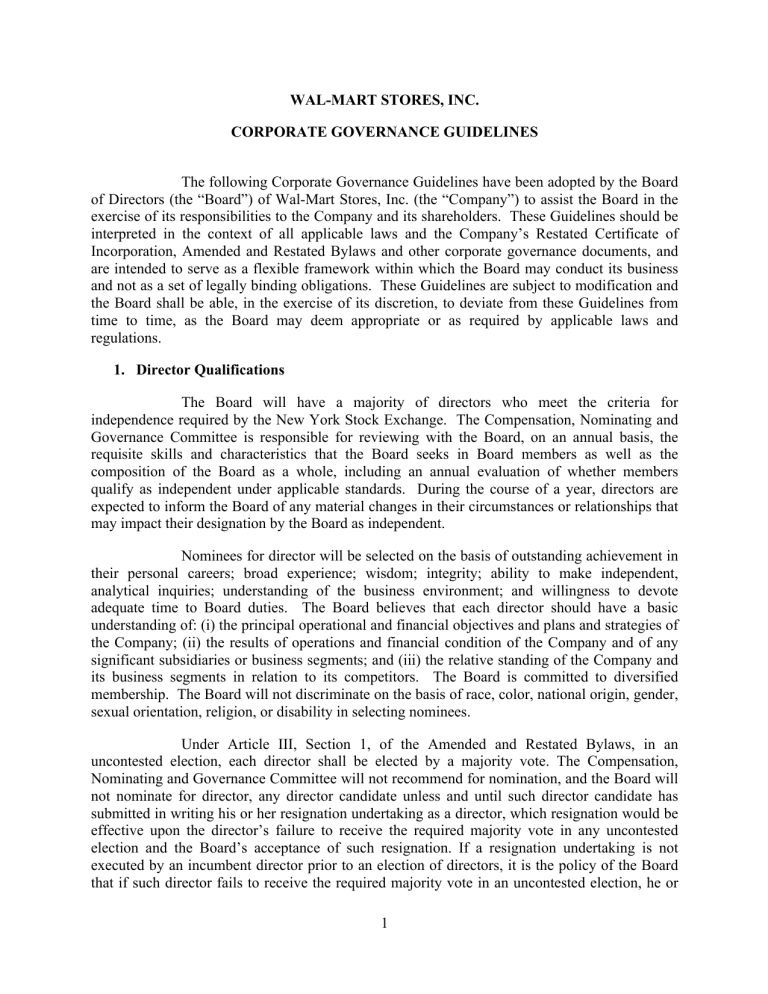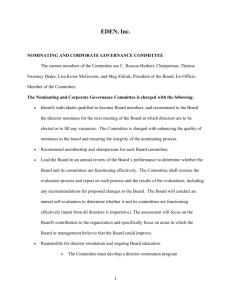
WAL-MART STORES, INC. CORPORATE GOVERNANCE GUIDELINES The following Corporate Governance Guidelines have been adopted by the Board of Directors (the “Board”) of Wal-Mart Stores, Inc. (the “Company”) to assist the Board in the exercise of its responsibilities to the Company and its shareholders. These Guidelines should be interpreted in the context of all applicable laws and the Company’s Restated Certificate of Incorporation, Amended and Restated Bylaws and other corporate governance documents, and are intended to serve as a flexible framework within which the Board may conduct its business and not as a set of legally binding obligations. These Guidelines are subject to modification and the Board shall be able, in the exercise of its discretion, to deviate from these Guidelines from time to time, as the Board may deem appropriate or as required by applicable laws and regulations. 1. Director Qualifications The Board will have a majority of directors who meet the criteria for independence required by the New York Stock Exchange. The Compensation, Nominating and Governance Committee is responsible for reviewing with the Board, on an annual basis, the requisite skills and characteristics that the Board seeks in Board members as well as the composition of the Board as a whole, including an annual evaluation of whether members qualify as independent under applicable standards. During the course of a year, directors are expected to inform the Board of any material changes in their circumstances or relationships that may impact their designation by the Board as independent. Nominees for director will be selected on the basis of outstanding achievement in their personal careers; broad experience; wisdom; integrity; ability to make independent, analytical inquiries; understanding of the business environment; and willingness to devote adequate time to Board duties. The Board believes that each director should have a basic understanding of: (i) the principal operational and financial objectives and plans and strategies of the Company; (ii) the results of operations and financial condition of the Company and of any significant subsidiaries or business segments; and (iii) the relative standing of the Company and its business segments in relation to its competitors. The Board is committed to diversified membership. The Board will not discriminate on the basis of race, color, national origin, gender, sexual orientation, religion, or disability in selecting nominees. Under Article III, Section 1, of the Amended and Restated Bylaws, in an uncontested election, each director shall be elected by a majority vote. The Compensation, Nominating and Governance Committee will not recommend for nomination, and the Board will not nominate for director, any director candidate unless and until such director candidate has submitted in writing his or her resignation undertaking as a director, which resignation would be effective upon the director’s failure to receive the required majority vote in any uncontested election and the Board’s acceptance of such resignation. If a resignation undertaking is not executed by an incumbent director prior to an election of directors, it is the policy of the Board that if such director fails to receive the required majority vote in an uncontested election, he or 1 she shall, promptly after certification of such vote, tender his or her resignation to the Chairman of the Board. The Company believes that it is important for each director to have a meaningful ownership interest in the Company. Within five years of joining the Board, each new outside (i.e., non-management) director will be required to own an amount of shares, restricted stock, or stock units equal in value to five times the annual cash retainer offered to each director at the time the director joined the Board. Nominees for directorship will be recommended by the Compensation, Nominating and Governance Committee to the full Board in accordance with the policies and principles in its charter. The invitation to join the Board should be extended by the Board itself, by the Chairman or Chairwoman (“Chairperson”) of the Compensation, Nominating and Governance Committee or the Chairman or Chairwoman (“Chairperson”) of the Board. It is the sense of the Board that a size of seven to sixteen directors is appropriate. However, the Board would be willing to consider a somewhat larger size in order to accommodate the availability of an outstanding candidate. It is the sense of the Board that individual directors who significantly change responsibilities or job positions should volunteer to resign from the Board. It is not the sense of the Board that in every instance the directors who retire or change from the position they held when they came on the Board should necessarily leave the Board. There should, however, be an opportunity for the Board, through the Compensation, Nominating and Governance Committee, to review the continued appropriateness of Board membership under the circumstances. Directors should advise the Chairperson of the Board and the Chairperson of the Compensation, Nominating and Governance Committee in advance of accepting an invitation to serve on another public company board. No member of the Audit Committee may serve on more than two other public company audit committees without first obtaining the prior approval of the Board. An outside director is expected to serve for at least five years. At the end of an outside director’s initial five-year period of service, the Chairperson of the Board should review with the Chairperson of the Compensation, Nominating and Governance Committee the relative contribution to the business of the Board by the director. After consulting with the Chairperson of the Compensation, Nominating and Governance Committee, the Chairperson of the Board will recommend to the Compensation, Nominating and Governance Committee whether the director should be invited to serve for an additional five-year period. An outside director shall not stand for re-election after he or she has served as a director for ten years. Notwithstanding anything herein to the contrary, an outside director who attains the age of seventy-five and has served as a director for five years shall not stand for reelection. Exceptions to this policy may be made by the Board. 2. Director Responsibilities The basic responsibility of the directors is to exercise their business judgment to act in what they reasonably believe to be in the best interests of the Company and its DM 6315480 2 shareholders, and to perform their duties of care and loyalty. In discharging that obligation, directors should be entitled to rely on the honesty and integrity of the Company’s senior executives and its outside advisors and auditors, to the fullest extent permitted by law. The directors also shall be entitled to have the Company purchase reasonable directors’ and officers’ liability insurance on their behalf, with the benefits of: (i) indemnification to the fullest extent permitted by law and the Company’s Restated Certificate of Incorporation, Amended and Restated Bylaws and any indemnification agreements; and (ii) limitation on liability to the Company as provided by state law and the Company’s Restated Certificate of Incorporation. The specific duties and responsibilities of the Board will include, among other things, overseeing the management of the business and affairs of the Company; selecting and recommending to shareholders appropriate candidates for election to the Board; reviewing and, where appropriate, approving the business plans, major strategies and financial objectives of the Company; evaluating Board processes and performance and the overall effectiveness of the Board; evaluating the performance of the Company and of senior management; requiring, approving and overseeing the implementation of the Company’s succession plans; reviewing compliance with applicable laws and regulations and adopting policies of corporate conduct to assure compliance with applicable laws and regulations and to assure maintenance of necessary accounting, financial, and other controls; and showing, through its actions, its awareness that the Company’s long-term success depends upon its strong relationship with its customers, associates, suppliers and the communities, including the global community, in which it operates. Directors are expected to serve on Board committees. If possible, a director will be appointed to the committee(s) in which he or she is interested. Directors are expected to attend regularly Board meetings and meetings of committees on which they serve, and to spend the time needed and meet as frequently as necessary to discharge properly their responsibilities. Information and data that are important to the Board’s understanding of the business to be conducted at a Board or committee meeting generally should be distributed in writing to the directors before the meeting, and directors should review these materials in advance of the meeting. The Board will meet at least five times per year and will hold additional meetings when needed to address issues of special concern or urgency. The Board has a policy of separating the offices of Chairperson of the Board and Chief Executive Officer (“CEO”). The Board believes that this issue is part of the succession planning process and that it is in the best interests of the Company for the Board to make the determination when it elects a new chief executive officer whether to continue this policy. The Company shall engage in an agenda review process for each Board meeting, which shall include the Chairperson, the Presiding Director, and the chairperson of each Board committee. At the conclusion of this agenda review process, the Chairperson of the Board and the Presiding Director shall jointly approve the agenda for each Board meeting. At the beginning of the year, the Chairperson of the Board and the Presiding Director will establish a schedule of agenda subjects to be discussed during the year (to the degree this can be foreseen). Each Board member is free to suggest the inclusion of items on the agenda. Each Board member is free to raise at any Board meeting subjects that are not on the agenda for that meeting. The Board will DM 6315480 3 review the Company’s long-term strategic plans and the principal issues that the Company will face in the future during at least one Board meeting each year. All meetings of the Board shall be held pursuant to the Amended and Restated Bylaws of the Company with regard to notice and waiver thereof, and written minutes of each meeting, in the form approved by the Board, shall be duly filed in the Company records. The outside directors will meet in executive session at least quarterly. If any outside director is not independent, at least once per year the independent directors shall meet alone in an executive session. In the event that the Chairperson of the Board is not independent under applicable securities exchange listing standards, at least annually, the independent directors shall appoint from among themselves a Presiding Director. This procedure will be disclosed in the Company’s annual proxy statement. The Presiding Director shall preside at all meetings of outside directors and independent directors. The Presiding Director shall also serve as a liaison between the Chairperson of the Board and the independent directors and is authorized to call meetings of directors, including separate meetings of outside and independent directors; and approves Board meeting agendas, schedules, and Board meeting-related information through the agenda review process described above. In addition, when appropriate, the Presiding Director will be available for consultation with major shareholders (generally defined as those holding 2 percent or greater of the Company’s outstanding common stock). The Company also will disclose in the annual proxy statement a method for interested parties to contact the Presiding Director, or the outside directors as a group, directly. To foster open discussions, the proceedings and deliberations of the Board are confidential. Each director will maintain confidentiality of non-public information received from the Company or its advisors. Consistent with these confidentiality requirements, the Board believes that the management speaks for the Company. Individual Board members may, from time to time, meet or otherwise communicate with various constituencies that are involved with the Company. It is expected, however, that Board members would do this with the knowledge of the management and, absent unusual circumstances or as contemplated by the committee charters, only at the request of management. The Board should ensure that information about sales, earnings, and important developments within the Company is provided by management to shareholders, potential shareholders and the investment community. Generally, directors should refer investors, market professionals and the media to the CEO or another individual designated by the Company. The Board acknowledges that proxy cards, ballots and voting tabulations that identify shareholders will be kept confidential unless disclosure is: (i) necessary to meet applicable legal requirements or to assert or defend claims for or against the Company; (ii) expressly requested by the shareholder (and then disclosure is limited to that particular shareholder's vote); or (iii) made during a contested proxy solicitation. Both the tabulators and inspectors of the election, who are appointed by the Board, are independent of the Company and are not Wal-Mart associates. 3. Board Committees The Board will have at all times an Audit Committee, a Compensation, Nominating and Governance Committee, an Executive Committee, a Global Compensation DM 6315480 4 Committee, a Strategic Planning and Finance Committee, and a Technology and eCommerce Committee. The members of the Audit Committee and the Compensation, Nominating and Governance Committee will be independent directors under the criteria established by the New York Stock Exchange, any other exchange on which the Company’s securities are traded, and any other applicable rules or regulations. Committee members will be appointed annually by the Board upon recommendation of the Compensation, Nominating and Governance Committee with consideration of the desires of individual directors. It is the sense of the Board that consideration should be given to rotating committee members periodically, but the Board does not feel that rotation should be mandated as a policy. Each committee will have its own charter. The charters will set forth the purposes, goals and responsibilities of the committees as well as qualifications for committee membership, procedures for committee member appointment and removal, committee structure and operations and committee reporting to the Board. The charters will also provide that each committee will annually evaluate its performance. The chairperson of each committee, in consultation with the committee members, will determine the frequency and length of the committee meetings consistent with any requirements set forth in the committee’s charter. At the beginning of the year each committee will establish a schedule of agenda subjects to be discussed during the year (to the degree these can be foreseen). The schedule for each committee will be furnished to all directors. During the year, the chairperson of each committee, in consultation with the appropriate members of the committee and management, will develop the agenda for each meeting. All meetings of each committee shall be held pursuant to the Amended and Restated Bylaws of the Company with regard to notice and waiver thereof, and written minutes of each meeting, in the form approved by the relevant committee, shall be duly filed in the Company records. A report regarding each committee meeting will be provided to the full Board, as appropriate. Upon request, a director will be given copies of the minutes of any committee meeting. In addition, the chairperson of each committee will report to the full Board regarding matters that should be brought to the attention of the Board. Where practicable, to be eligible to serve as Chairperson of a committee, that member should have served previously for at least one year as a member of the committee. The Board and each committee have the power to hire independent legal, financial or other advisors, as they may deem necessary, without consulting or obtaining the approval of any officer of the Company in advance. The Board may, from time to time, establish or maintain additional committees as necessary or appropriate. DM 6315480 5 4. Director Access to Officers, Associates and Outside Advisors Directors have full and free access to officers and other associates of the Company and the Company’s outside advisors. Any meetings or contacts that a director wishes to initiate may be arranged through the CEO or the Secretary or directly by the director. The directors will use their judgment to ensure that any such contact is not disruptive to the business operations of the Company. It is the expectation of the Board that directors will keep the CEO informed of communications between a director and an officer or other associate of the Company, as appropriate. At least once per year management will report to the Board regarding management development and succession, including diversity initiatives and progress and longterm strategic planning. Inclusion of the CEO and other executives on the Board provides the Board with information and insight about the Company. Other executives may attend Board meetings or committee meetings at the invitation of the Chairperson of the Board or the CEO to provide information and insight to the Board. 5. Director Compensation The form and amount of director compensation will be reviewed and recommended by the Compensation, Nominating and Governance Committee to the Board for approval in accordance with applicable legal and regulatory guidelines. The Compensation, Nominating and Governance Committee will conduct an annual review of director compensation. The Compensation, Nominating and Governance Committee will consider that directors’ independence may be jeopardized if director compensation and perquisites exceed customary levels, if the Company makes substantial charitable contributions to organizations with which a director is affiliated, or if the Company enters into consulting contracts with (or provides other indirect forms of compensation to) a director or an organization with which the director is affiliated. 6. Director Orientation and Continuing Education Each new director must participate in the Company’s Orientation Program, which should be conducted within a reasonable period of time after a director is first elected to the Board. This orientation will include familiarizing new directors with the Company’s strategic plans, its significant financial, accounting and risk management issues, its compliance programs, its Statement of Ethics, its principal officers, and its internal and independent auditors. In addition, the Orientation Program will include a visit to the Home Office of the Company to meet with senior management, including the Chief Legal Officer regarding his or her legal duties as a director, and tours of Company facilities to understand better the Company’s business and culture. All other directors are also invited to attend the Orientation Program. In addition, each director is expected to maintain the necessary level of expertise to perform his or her responsibilities as a director. The Company may, from time to time, offer continuing education programs to assist the directors in maintaining such level of expertise. DM 6315480 6 7. CEO Evaluation and Management Succession The Compensation, Nominating and Governance Committee will conduct an annual review of the CEO’s performance, as set forth in its charter. The Board will review the Compensation, Nominating and Governance Committee’s report in order to ensure that the CEO is providing the best leadership for the Company in the long- and short-term. The Compensation, Nominating and Governance Committee should make an annual report to the Board on succession planning. The entire Board will work with the Compensation, Nominating and Governance Committee to nominate and evaluate potential successors to the CEO. The CEO should at all times make available his or her recommendations and evaluations of potential successors, along with a review of any development plans recommended for such individuals. 8. Annual Performance Evaluation The Board and the committees will conduct annual self-evaluations to determine whether they are functioning effectively. The Compensation, Nominating and Governance Committee will receive comments from all directors and report annually to the Board with an assessment of the Board’s performance, as well as the performance of the committees. This will be discussed with the full Board following completion of the assessment. The assessment will focus on the Board’s and each committee’s contribution to the Company and specifically focus on areas in which the Board and each committee believe improvement could occur. These guidelines were most recently amended on February 7, 2014. DM 6315480 7





